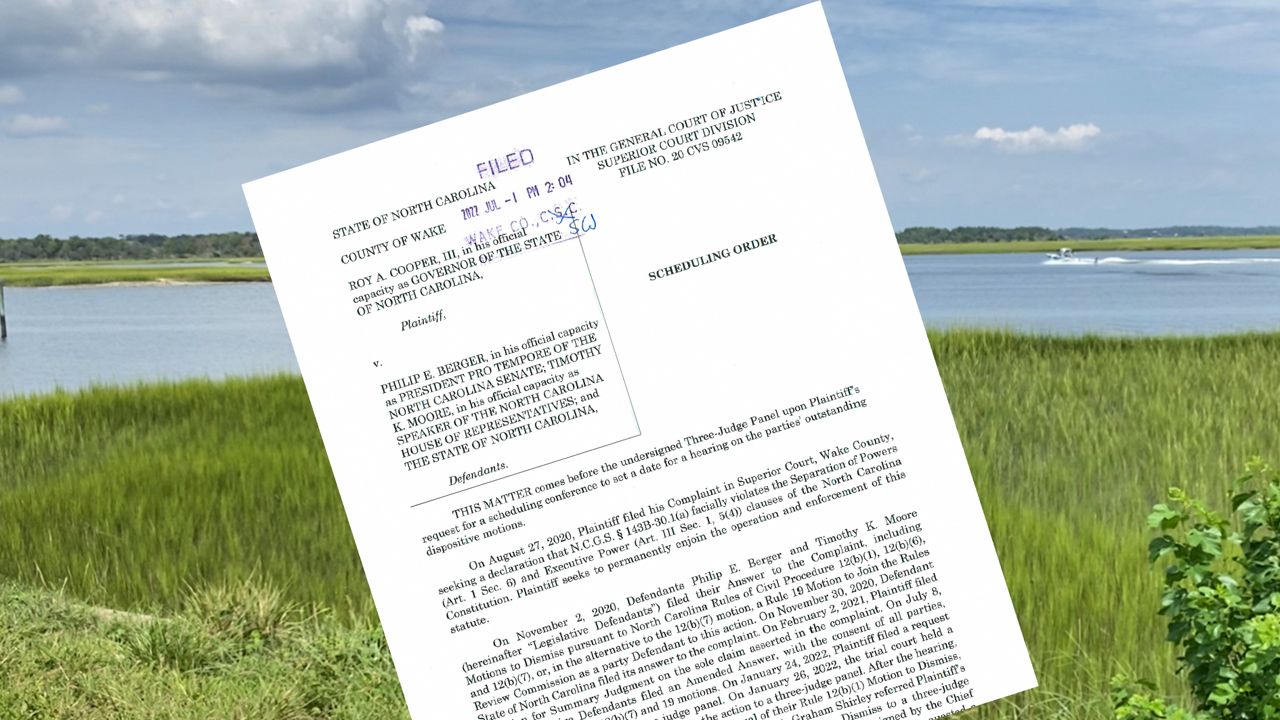The Rules Review Commission has been around for decades. For much of that time it focused on some of the most mundane work of governing in North Carolina: reading statutes, reviewing rules from state agencies, making sure all the i’s are dotted, the t’s crossed and everything lines up with the intent of state law.
A lawsuit, filed by the governor in 2020, argues the commission is overstepping its bounds. The commission, appointed by the legislature, can veto rules from state agencies. The lawsuit says that violates the separation of powers as laid out in the North Carolina Constitution.
The commission made headlines recently when it rejected new temporary rules from the State Board of Elections that made changes to how poll workers and election observers conduct themselves during an election.
“These rules were designed to go into place during the midterms because we do have concerns that poll disruption is the aim of a very small fraction of our society, but something that we need to be concerned about,” said Damon Circosta, chair of the State Board of Elections.
“The State Board of Elections voted unanimously to clarify the rules around what observers can and cannot do,” he said. “They didn’t believe that we had the authority under the statute. I just fundamentally disagree with their findings.”
Circosta said the elections board could try to make new permanent rules or take the commission’s decision to court in a separate lawsuit.
These rules that go before the commission run the gamut of state governance: drinking water standards, licensing day care centers, workplace safety, how elections are run. They take months or years to make, using advice from scientists or other experts to draft new rules, taking public comment and meeting with stakeholders.
The commission is appointed by leaders in the General Assembly: North Carolina Senate President Pro-Tem Phil Berger and Speaker of the House Tim Moore, both Republicans. The governor does not appoint his own members to the commission.
“Sen. Berger intends to mount a vigorous defense against another one of Gov. Cooper’s partisan power grabs,” Berger’s spokeswoman said in an email recently when asked about the lawsuit.
But others disagree, arguing that the commission violates the North Carolina Constitution.
"We now have a legislative body, a body controlled by the legislature, essentially being able to veto anything which the governor attempts to do, and that’s just a classic violation of separation of powers," said Kim Meyer, an attorney with the Southern Environmental Law Center.
Meyer represents a group of environmental nonprofits, including the Cape Fear River Watch and the North Carolina Coastal Federation, that filed a “friend of the court” brief supporting the governor’s lawsuit.
“Essentially what the RRC can do is it can block any of the administrative rules that the governor’s administration puts forward," Meyer said. This creates a problem because the RRC is not an elected body, it’s a body that is appointed by the legislature.”
Government rule-making is a time-consuming process, typically delegated to state agencies in the executive branch. In North Carolina, that includes the Department of Environmental Quality, the Department of Health and Human Services, the Department of Agriculture and the Department of Insurance.
State departments are tasked with implementing state law, and frequently that includes making new rules based on statutes passed by the General Assembly.
In May, the commission rejected a rule from the Department of Environmental Quality.
“The baseless objection has the effect of preventing Gov. Cooper from fulfilling his constitutional role to faithfully execute the laws of our state and protect North Carolina’s treasured wetlands,” the environmental groups wrote to the court.
The commission also blocked a new water quality rule this year.
“The RRC is currently blocking passage of a new water quality standard for 1,4-dioxane from going into effect, threatening the health and welfare of North Carolinians,” according to the brief. The commission argued the process to make the rule did not follow the Administrative Procedures Act for its cost analysis.
The environmental organizations say they are concerned about a new E. coli rule that would need to go before the commission. State environmental regulators are working on a rule now that would limit the amount of E. coli allowed in water.
“You really want scientists and experts to be assessing the level of E. coli in the water. You don’t want this legislatively controlled body stepping in with a political decision,” Meyer said. “That’s what the executive does. It looks at the laws that are on the books and it implements them with the expertise in an agency.”
In their response to the lawsuit, lawyers for legislative leaders point out that Cooper himself, while in the General Assembly, supported the changes to the commission that gave the body veto power over new rules.
"Since the ratification of the 1971 Constitution, the North Carolina General Assembly has created, revised and amended the duties and responsibilities of the Rules Review Commission on multiple occasions, including while the plaintiff was a member of the North Carolina Senate," the response states.
"The actions of the North Carolina General Assembly with respect to the Rules Review Commission have been subject to the power granted to the North Carolina General Assembly by the People, and do not violate any provision of the North Carolina Constitution," Berger and Moore argue.
The lawsuit, filed in Wake County, is scheduled for a hearing in November, the day after the midterm elections. A three-judge panel could rule on the merits of the governor’s argument. If they agree, they could potentially declare the commission unconstitutional.



